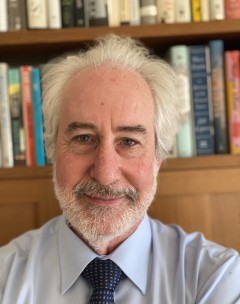Thriving Schools: Preventing Bullying & Promoting Well-Being
Creating a strong and nurturing school community is the key for lifelong learners, said Columbia Prof. Jonathan Cohen during a recent webinar.

Creating a school community that is both strong and nurturing is paramount for cultivating lifelong learners, emphasized by Dr. Cohen during our recent webinar titled “Thriving Schools: Preventing Bullying & Promoting Well-Being”. Drawing on educational, psychological, and developmental research, Dr. Cohen highlighted the significance of social and emotional learning, alongside linguistic and mathematical proficiency. In addition, he underscored the need for a secure and supportive environment where educators and students alike can feel valued and invested.
During our April 10 webinar, Jonathan Cohen, Adjunct Professor of Psychology and Education at Teachers College, Columbia University, discussed ways to establish thriving educational environments that promote student success not only in school, but also in life. Over the last 30-35 years, K12 educators worldwide have learned that focusing solely on language, mathematical, and logical thinking skills, while foundationally important, is not enough. Competencies that underlie success in school and life come from learning how to listen to ourselves and others, understand them, and become creative and flexible social and emotional problem solvers.
However, such competencies can only be developed in a safe and supportive school environment. As important as teaching and learning at the classroom is, “how safe or not safe, how supported or not supported, how engaged or not, and at least some of the time, how joyful students feel about their learning experience is also critical,” said Dr. Cohen. He stressed that emotional, intellectual, and social safety, in addition to physical safety, are critical for students' learning experience. Unfortunately, many students around the world report feeling unsafe due to bullying and other negative behaviors.
Dr. Cohen suggested that an excellent first step for school communities is to ask questions such as “How are we creating a safe, caring climate for learning?” or “What kind of school do we want to have?”. According to Dr. Cohen, most often, the answers involve creating a respectful environment where everyone takes responsibility to help those in need. To formalize this, internal discussions are vital for each school to determine what it means exactly to be respectful and helpful. He also underlined that being collaborative with students is essential and makes a world of difference for meaningful and lasting change.
Dr. Cohen lastly referred to creating a community of “upstanders” to further foster a safe and caring school climate, stand up for those in need and contribute to a safe and caring school climate. By asking children what they would want others to do in a harmful situation, a school can promote powerful conversations about how to create an upstanders community. According to Dr. Cohen, this always leads to powerful conversations about how to formalize an upstanders community.
Concluding his words, Dr. Cohen emphasized the importance of involving students, educators, and parents in a school’s vision. Ultimately, this engagement supports a safe, caring, and engaging school climate that fosters healthy development and student learning.
About the Speaker:
Jonathan Cohen is an Adjunct Professor of Psychology and Education at Teachers College, Columbia University, and the co-president, with Professor Rosario del Rey, of the International Observatory for School Climate and Violence Prevention at the University of Seville. He is a leading authority in the fields of school climate, social-emotional-civic education, and mental health.

As a mental health clinician and an educator, Dr. Cohen’s professional life has been focused on what supports and hinders children’s ability to learn and develop in healthy ways. Over the last three decades he has also focused on what supports and hinders K-12 schools to become learning organizations and to develop in ways that support children and educators’ healthy development.
Dr. Cohen founded The National School Climate Center (NSCC), a free standing, non-profit organization that promotes safe, supportive learning environments that nurture social and emotional, civic, and academic growth for all students and their ability to learn in thriving schools.
Dr. Cohen works clinically with children, their families and adults as a practicing clinical psychologist and psychoanalyst.
He has written over 100 scholarly publications, edited/co-authored six books including Making Your School Safe: Strategies to Protect Children and Promote Learning. The American Library Association has awarded the Best Academic Book of the Year two of the books he edited: Educating Minds and Hearts: Social Emotional Learning and the Passage into Adolescence and Caring Classrooms/Intelligent Schools: The Social Emotional Education of Young Children.
He has lectured around the world to educators, parents, and mental health professionals. He consults to State Departments of Education, foreign educational ministries, UNICEF’s Child Friendly Schools Program, and the World Bank around a range of school climate, social emotional learning and mental health promotion efforts.